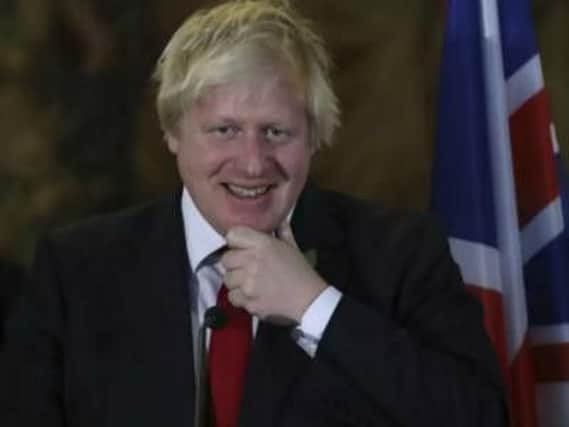Downing Street defends Boris Johnson over Brexit WWII reference


Responding to reports that Mr Johnson likened the French leader to a German Second World War general, a spokesman said he was making "a theatrical comparison" and did not need to apologise.
The latest gaff by the Foreign Secretary comes as European leaders continue to react to Theresa May's 12-point plan for Brexit, with European Commission president Jean Claude Juncker warning negotiations will be "very difficult".
Advertisement
Hide AdAdvertisement
Hide AdIt also comes as Brexit Secretary David Davis revealed European rules could still apply in the UK until 2021, and Parliament will not have power to block Brexit when they vote on a final deal.
Mr Johnson's controversial comments were reportedly delivered during an official visit to Delhi, in response to France's long-running criticism of Britain's decision to leave the EU.
He told reporters: "If Mr Hollande wants to administer punishment beatings to anybody who seeks to escape [the EU], in the manner of some world war two movie, I don’t think that is the way forward, and it’s not in the interests of our friends and partners.
“It seems absolutely incredible to me that, in the 21st century, member states of the EU should be seriously contemplating the reintroduction of tariffs or whatever to administer punishment to the UK.”
Advertisement
Hide AdAdvertisement
Hide AdThis perceived Nazi reference immediately drew criticism from MPs, with Labour's Wes Streeting describing it as "crass" and "no way for the Foreign Secretary to behave".
"It seems the Foreign Secretary has been leafing through his well-thumbed copy of How to Lose Friends and Alienate People," he said.
"To get a deal that protects our economy and keeps Britain an open, tolerant country, we need to negotiate in good faith and with courtesy with our European partners."
But Number 10 moved to downplay the comments, saying Mr Johnson was making "a theatrical comparison" to "[make] a point about punitive deals".
Advertisement
Hide AdAdvertisement
Hide AdThey argued this had been "hyped-up" and suggested there was no need for Mr Johnson to apologise.
The controversy came as EU leaders, including Commission president Jean Claude Juncker, weighed in on yesterday's Brexit speech by the Prime Minister.
In a speech to the European Parliament, Mr Juncker welcomed the clarity provided by Mrs May and vowed to secure a "a balanced solution" to negotiations.
He added that European negotiators are not "hostile" to the UK, but warned talks would be "very, very, very" difficult.
Advertisement
Hide AdAdvertisement
Hide AdThis followed a speech by the Maltese Prime Minister Joseph Muscat, in which he said negotiations will be an “arduous task” and “not a happy event”.
He added that any new deal for the UK must be "inferior" to EU membership.
Earlier in the morning, David Davis told reporters that the transition period between leaving the EU and new regulations kicking in could take up to two years.
As a result, some EU laws governing areas such as trade or border controls could still be in place in the UK until around 2021.
Advertisement
Hide AdAdvertisement
Hide Ad"At the end of two years, we will have our deals, what may take a little longer is implementation," he told the BBC.
"I don't know, whether it's customs arrangements or it's a time for companies to accommodate things, or whether it's border arrangements, or some other elements.
"And we've said we accept that there may be an implementation phase thereafter... It won't be a long time...a year or two."
He also stressed that giving Parliament a vote on the final exit deal with the EU was not an invitation for MPs and peers to block Brexit.
Advertisement
Hide AdAdvertisement
Hide AdBut he would not say whether a vote against the deal would see the UK would revert to World Trade Organisation rules.
"Parliament, remember, gave the decision on leaving to the people, by a vast majority it decided it was the people who made the decision in the referendum, so it's not for Parliament to reverse that," he said.
"So at the end of the day they will end up deciding on the mandate."